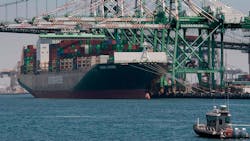Decarbonization of Shipping Will Cost $1 Trillion
In order to reduce the shipping industry's greenhouse gas (GHG) emissions by 50% by 2020, it will require around $1 trillion, according to a new study conducted by University Maritime Advisory Services (UMAS) and the Energy Transitions Commission (ETC).
According to the study, the annual average investment needed would be $40-60 billion over the next two decades, and to fully decarbonize the global shipping industry by 2050, an additional $400 billion of investment would be needed over 20 years, bringing the total to $1.4 - 1.9 trillion.
“Our analysis suggests we will see a disruptive and rapid change to align to a new zero-carbon system, with fossil fuel aligned assets becoming obsolete or needing significant modification,” said Dr. Tristan Smith, Lecturer at UCL’s Energy Institute.
The study shows the biggest share of investments is needed in the land-based infrastructure and production facilities for low carbon fuels, which make up around 87% of the total. This includes investments in the production of low carbon fuels, and the land-based storage and bunkering infrastructure needed for their supply.
Only 13% of the investments needed are related to the ships themselves, which include the machinery and onboard storage required for a ship to run on low carbon fuels in newbuilds and, in some cases, for retrofits. Ship-related investments also include investments in improving energy efficiency, which are estimated to grow due to the higher cost of low carbon fuels compared to traditional marine fuels.
This makes the challenge of decarbonizing the shipping sector a whole system challenge and not something just for shipping. Given the majority of investment is on land, any R&D fund needs to enable deployment and scaling of the land-side, and not just work on equipment for ships. The risk is that we get a fleet of zero-emission ships, no decarbonization of fuel production (e.g. producing ammonia using natural gas) and then shift the emissions upstream. This means every stakeholder, including governments, fuel producers and ship owners have a stake and a responsibility in shipping’s decarbonization.
“Much of shipping’s decarbonization will take place on land. It is a systemic transformation that goes beyond the capabilities of the maritime industry alone," said Lord Adair Turner, chair of the Energy Transitions Commission We need to bring together the full range of upstream and downstream fuels value chains to unlock shipping’s shift to zero-carbon energy sources. Done right, this represents a trillion-dollar market opportunity”
The target of cutting GHG emissions by at least 50% over the next three decades was set by the U.N. shipping agency, the International Maritime Organisation’s (IMO) in April 2018, marking the first commitment made by the sector to tackle climate change.
